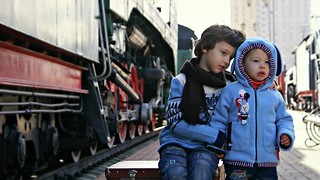Review: Are You Sitting Comfortably?
Ella Whiddett was not sitting comfortably, but was nonetheless intrigued by Are You Sitting Comfortably?, Eloise Poulton’s adaptation of Roald Dahl’s short stories at Corpus Playroom

Quite frankly, no, I was not sitting comfortably. Or at least I was, until the production got under way, with its morbid exploration of the corrupted adult world envisioned by Roald Dahl that we are so rarely exposed to.
Eloise Poulton’s adaptation of Dahl’s short stories for adults onto the stage immerses its audience in the anarchic space where childlike storytelling meets adult reality, making it an experience to behold, or, for some, a complete puzzlement.
The scene is already set as the audience enters Corpus Playroom. On the seats, an order of service sits, with a sweet to tide you over, just like your granny gave you in church as a child to keep you quiet. The persistent audio and flashing TV screens contrast with the stillness of the actors on stage to a hypnotic effect, one that is both riveting but also increasingly disturbing as the minutes tick by.
The play is split into different sections, each taking a Dahl short story and dramatising it. The play begins with ‘William and Mary’, the story of a man who leaves his brain to science, allowing him to live on consciously without a body. His wife, initially disgusted, comes round to the idea that she can now taunt her husband for the rest of eternity, introducing a dark sense of humour which sets the tone for the whole production. Kathryn Cussons as Mary makes a fantastic transition from dry middle-class wife to empowered woman, while Eleanor Booton as Dr Landy, shows impressive enthusiasm for a skin-crawlingly horrific concept.
The next story was the odd one out, as Spence takes on the role of a soldier suffering from Post-Traumatic Stress Disorder, without any of the underlying humour as relief from its morbidity. Nevertheless, the final act – ‘Georgy Porgy’ – saved the production, as Matt Gurtler gave a remarkable monologue from the point of view of a deranged vicar.
At first, it felt like a mish-mash of random ideas, but concerted effort was made to rectify this – to varying degrees of success. The inclusion of physical drama to link sections was problematic: it was too abstract in a plain sense, but it did explore themes, like sexualisation and care-giving, that were prompted from the stories themselves.
Additionally, unifying ideas and motifs, such as being trapped within yourself, adults behaving badly just to spite one another, and gender relations managed to give an over-arching, if vague, sense of unity. Other directorial and production decisions were more successful: the set was creative, ranging in its mediums of immersion, and the doubling of props – table as bed, mortuary trolley and shop counter – was comedic.
Ultimately, these stories and their adaptation encapsulate Dahl’s vision of a disturbingly anarchic and unhappy adult world. For viewers only familiar with his children’s writing and traditional theatre, it’s a shock to the system, and perhaps one that can’t quite be hurdled over. For others, who like a taste of the chaotic, it seems to be simultaneously cathartic and troubling to find oneself laughing at deeply dark images.
This production grasps at Dahl’s own observation that a child’s mind is “half-civilised” and nods to the fact that this seems to be true, too, of adults. The best approach might be the take these stories as separate and enjoy them accordingly. The dramatisation of these short stories seems to be the jarring issue at hand: the stage may not be the best place for this kind of story-telling.
Nevertheless, a great cast and good direction make Are You Sitting Comfortably? a wonderfully uncomfortable watch, which can be both refreshing, or just plain strange
 News / Cambridge climbs to third in world Uni rankings11 October 2025
News / Cambridge climbs to third in world Uni rankings11 October 2025 News / Pro-Palestine protesters stage city centre rally12 October 2025
News / Pro-Palestine protesters stage city centre rally12 October 2025 News / Tompkins Table 2025: Trinity widens gap on Christ’s19 August 2025
News / Tompkins Table 2025: Trinity widens gap on Christ’s19 August 2025 Music / South London comes alive at Rally Rally Rally music festival11 October 2025
Music / South London comes alive at Rally Rally Rally music festival11 October 2025 Film & TV / The curious incident of The Doctor in the TARDIS11 October 2025
Film & TV / The curious incident of The Doctor in the TARDIS11 October 2025









